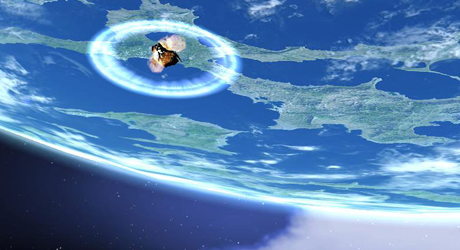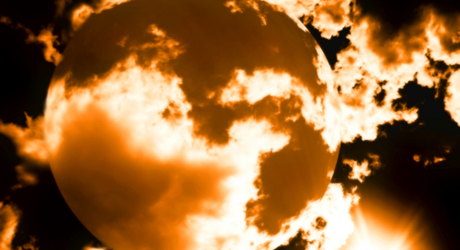
47- With power did We construct heaven. Verily, We are expanding it. (51- The Dispersing, 47)
Is the universe infinite? Or is it finite in a steady state? From the very beginning of humanity this has been a subject of debate between great minds. Hot debates and discussions of all kinds failed to clarify this dilemma. This had once been the subject of philosophical speculations before it yielded its place to the science of physics. Some of the great minds argued that the universe was not a confined space, while others contended that its boundaries were drawn. The Quran describes it as a continuously expanding and dynamic universe. According to this description, the universe has a new aspect every instant that deviates from the concept of an infinite space; its perpetual expansion defies the concept of a confined and steady state universe. Thus, the Quran propounds a third alternative, leaving the heated controversy of thinkers in abeyance.
This may contribute to the formulation of a judgment for the inquiring minds, which are trying to figure out whether the Quran is God’s revelation or not. We have, on the one hand, Muhammad in the desert, neither a philosopher nor a physicist, and, on the other hand, the assumptions of great thinkers and philosophers such as Aristotle, Ptolemy, Giordano Bruno, Galileo Galilei and Isaac Newton, to name but a few. The greatest minds in history, basing their arguments on observations and formulas they had, claimed either that the universe had its confines or that it was an endless space, but it occurred to none of them to think of a dynamic expanding universe, until the 20th century when Edwin Hubble, by means of a telescope, demonstrated that the universe was expanding. The theory of expansion of the universe was first advanced in the 1920s. Until the descent of the Quran no other source had made such an assertion!
MUHAMMAD’S TELESCOPE
Unbelievers contended that the Quran was Muhammad’s own fabrication and not the revelation of God. How then would these dissenters explain the fact that Muhammad had been the only person who was aware of the expanding universe long before the 1920s. Could it be that in the 600s he had invented a telescope similar to the one contrived in the 1900s? Could it be that he had been familiar with the handling of such a telescope and acquainted with the motion of stars and that he had concealed it from his fellow men? If those who accused the Prophet of lunacy and alleged that in his delusional states he imagined himself the messenger of God were justified in their claims, how would they account for the fact that he knew facts not known to his contemporaries, facts that were to be discovered 1300 years after his revelation of them? If those people assert that the Prophet had devised a religion to serve his own ends, how can they explain that his so-called delusions materialized after a lapse of 1300 years? His pronouncements at the time did not promote his interests in any way; quite the reverse was the case, since he unwittingly gave his enemies a hint they might take advantage of. Can a person whose own interests prevail over the interests of others declare something not to his own advantage that was sure to be bitterly censured and much derided by those whose naked eyes failed to observe the expansion of the universe? If, despite this, a person came up with the contention that Muhammad was an intelligent man who might have perceived this truth, what sort of an intelligence might this have been? And, instead of boasting of having been the depository of such knowledge, why would he have preferred to tell an untruth and claim that this was not his own discovery but the revelation by God? While the inventor or discoverer of a pin is inclined to brag about his breakthrough, why on earth would Muhammad choose to be modest and categorically declare that the Quran was not his own production, but the revelation of God? Was this due to humility? Would these people – who had denied his prophethood and accused him of having been an impostor - have dared qualify him with the laudable attribute of “humility?”
DISCOVERY OF THE EXPANDING UNIVERSE
There was a gap in Newton’s physics. Newton believed in an endlessly vast and static universe. His law of gravity encountered a problem. How was it that the physical bodies, in the course of eons, defied their mutual attractions and did not collapse into a unity? The formula that Einstein devised abandoned the absolute notions of space and time as reference points for all objects in the universe. Basing his studies on Einstein’s formulas, Alexander Friedmann, a Russian physicist, discovered that the universe must be expanding. Georges Lemaître, a Belgian cleric, astronomer and cosmologist, formulated that the universe had begun in a cataclysmic explosion of a small, primeval superatom, like the growing of an oak tree from an acorn. This theory explained the recession of galaxies within the framework of Albert Einstein’s theory of general relativity. This idea was so incredible that even Einstein had problems accepting it, despite the fact that this all had originated from his own formulas. Einstein, rather, countered that physics was not the forte of Lemaître, and the universe was an infinite expanse and in a steady state.
Lemaître’s theory posited that the universe was expanding. This was a statement that no philosopher and no scientist had ever before set forth. Kant had said in his Critique of Pure Reason that this was an enigma unsolvable by human intelligence. This theory fit everything and explained the reason why the universe did not collapse in spite of gravity. The key had fit into the lock. It was the correct explanation of the enigma. However, this statement met with the usual adverse reaction: “No, it is not the truth…”
Remaining outside the sphere of theoretical controversy, American astronomer Hubble was, about the same time, making observations with his sophisticated telescope in the Mount Wilson Observatory. He observed that galaxies were receding from each other, which proved that the universe was expanding. In answer to those who said they could not believe in things their eyes had not witnessed, Hubble’s discovery led to the following declaration: “Now that you see it, you have got to believe it.” Hubble showed this by the Doppler Effect. Thus the wavelengths of receding bodies prolonged in the spectrum of light waves would shift to red, while, if the bodies approached each other, the wavelengths would shorten, shifting to blue. The light that came from galaxies that shifted to red showed that the galaxies were receding. In line with this observation, Hubble discovered a striking law: the speed of galaxies that receded was directly proportional to the distance between galaxies. The farther away a galaxy stood, the more its speed of recession accelerated. The result was tested again and again. In 1950, a high-magnification telescope was installed on Mount Palomar in the USA, the largest instrument of its kind. The new tests and controls justified this observation. The measurements made pointed to the fact that the creation of the universe occurred about 10-15 billion years ago.
Both Einstein and Lemaître took an interest in Hubble’s work; Einstein, who did not agree with Lemaître at first, eventually acknowledged during a conference that Lemaître was right after all. He confessed that his failure to endorse these findings had been the gravest error in his life. Thus it was that the fact that the universe was of a dynamic nature and expanding, confirmed by observations was also validated by the great physicist Einstein.
In the examples presented by Hubble and Lemaître, we see how a physicist arrives at a conclusion both in theory and through observation. While Lemaître demonstrated how he had made inferences from Einstein’s formulas to substantiate his theoretical discoveries, Hubble presented the data of his observations and his conclusions. As we see, the result obtained by physicists is the consequence of cumulative and collective bits of knowledge and research. The Creator of physical laws provides the answer in the Quran to the issues of towering importance throughout human history. The Quran’s presentation of scientific facts is clear, direct, and concise; it is different than the presentation of scientists, which tends to be complicated by scientific methods and procedures. The provider of this answer does not have to go through all the labyrinths a scientist has to. The Quran’s method is perfectly straightforward, unswerving and explicit.
If we had the possibility of looking at the universe from above and somebody asked us to describe what we saw, our answer would be that it was expanding. To achieve the Quran’s revelation of this fact 1400 years ago, man would have needed access to the assistance of accumulated scientific data acquired throughout long years and to sophisticated telescopes. When people claim that science and religion oppose each other, the Quran furnishes answers to the most complicated scientific problems. Observations made by sophisticated telescopes today confirm the statements of the Quran.
The Quran, perfectly aware of the human psyche with its prescience, states that nonbelievers will insist on their convictions regardless how many miracles are presented to them. Some ask: “Why did the people also not believe in Jesus, who had performed miracles and healed the sick and the blind?” This example demonstrates why the majority of people did not believe in Christ and the other prophets, despite their miracles. Miracles change in fact as time goes by, but the negative attitude of most humans remains unchanged.
REASON FOR THE USE OF THE ROYAL PLURAL
We think it would be beneficial to explain the reason for the use of “We” in the verse analyzed in this chapter. God uses both the royal plural “We” and the first person singular “I.” Some languages use the first person plural “we” to express grandeur and exalted rank.
In the hundreds of references addressing God in the second person, the pronoun used is “Thou” and never the plural “You” or “Ye.” The thousands of references made to Him as a third person always use the pronoun “He” and never “They.” References in the Quran to God always use either the second or the third person, and none of them as a second or third person plural. Thousands of times in the Quran, God is referred to as “Allah,” “Gracious (Rahman),” Merciful (Raheem),” and “Lord (Rab)” and all of these words are in the singular, never the plural.

